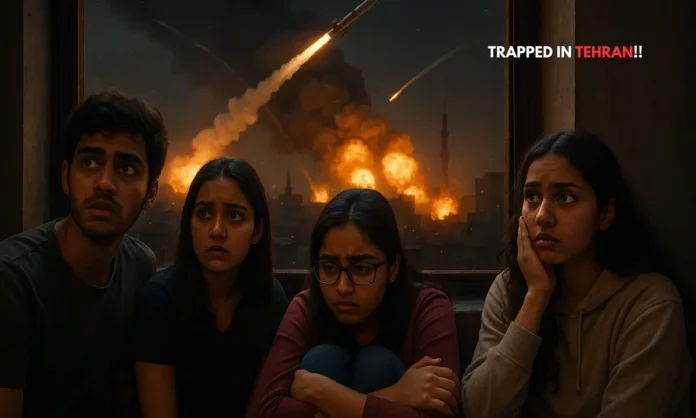Summary
- Indian medical students in Tehran report terrifying nights of blackouts, drone-filled skies, and multiple blasts amid escalating Israel-Iran warfare.
- Tehran University officials provided on-ground reassurance, but students now appeal to the Indian government for urgent evacuation.
- The Indian Embassy in Iran has activated helplines and a dedicated Telegram link, recalling efforts similar to the Ukraine crisis.
“We Heard the Blasts at 3:20 AM”: Indian Voices from a Dorm Under Siege
As the air war between Israel and Iran entered its most destructive phase, nearly 140 Indian students found themselves stranded in Tehran—many too scared to sleep, too traumatised to stay, and too uncertain to know what comes next. These are young men and women, mostly enrolled at the Tehran University of Medical Sciences, who now wake not to alarm clocks or lectures, but to missile sirens, drone hums, and midnight explosions.
Their recollections are chilling: “We heard a huge blast around 3:20 am. Black smoke filled the sky. Fighter jets passed above. The dormitory had a complete blackout—we sat in the dark, hearing one boom after another.” That was how one student narrated the chaos. The fear was universal; the desperation, mounting.
Despite commendable support from senior university officials—Deans checking on students, vice-Deans arriving late into the night—confidence is fading. “We don’t have the heart to spend another night here,” said another student. The stress is compounded by the spiralling situation outside: Tehran’s skies are now an unofficial war zone, lit not by stars, but by anti-aircraft fire and drone warfare.
This isn’t an isolated crisis. It mirrors past patterns of India’s geopolitical evacuations—from Ukraine, Sudan, or Yemen. Except this time, the ask is not just evacuation—it’s urgent reassurance that someone is watching, that diplomacy will work as fast as missiles fly.
🇮🇳💬 "We are scared":Indian students in Tehran. With tensions peaking after the Iran-Israel flare-up, Indian students plead for evacuation
— Harmeet KKaur (@HarmeetKKaur) June 15, 2025
Is a rescue mission on the cards?
The parents are highly worried about the safety of the students..#IranIsrael #IndianStudents #Evacuation pic.twitter.com/bRbFRqaRhF
Evacuation or Uncertainty: India’s Embassy Reacts Amid the Crossfire
- The Indian Embassy in Iran has created a Telegram group and shared emergency helplines.
- Official instructions urge nationals to stay in touch and avoid panic.
- Students remember India’s swift rescue operations during the Ukraine conflict, urging a repeat.
- Israel’s ongoing Operation Rising Lion and Iran’s retaliatory strikes have created a volatile environment.
- Evacuation logistics are hampered by active aerial combat and closed airspace.
The Indian Embassy in Tehran wasted no time issuing digital lifelines. Through official posts on X (formerly Twitter), they shared a Telegram link—“ONLY for those Indian nationals currently in Iran”—and emergency helpline numbers. The move is practical, and perhaps essential, in a war theatre where even phone signals can be jammed or monitored.
Yet digital links offer little solace in the face of escalating air raids. With Israel’s Operation Rising Lion targeting Iranian military and nuclear installations, and Iran retaliating with drone strikes and ballistic missiles under its own “Operation True Promise 3”, the battle has crept far beyond strategic sites. Civilians—especially foreign students—are increasingly at risk.
This is not lost on the students. “We trust India’s power. We remember what they did during the Ukraine crisis,” said one hopeful voice. It’s a direct appeal to the government: if diplomatic corridors can be opened, if airlifts can be coordinated through neutral countries like Oman or Armenia, safety might yet be within reach.
Notably, some reports already mention that 110 Indian students have been evacuated from Tehran to Armenia as of June 17, according to India’s Ministry of External Affairs. But for the ones still in Iran, each day without clarity feels like a gamble with fate.
What Happens Next? A Geopolitical Puzzle with Human Stakes
- Israel’s campaign is targeting Iran’s military echelon and nuclear infrastructure.
- Tehran’s counter-offensive promises continued escalation until Israeli strikes cease.
- Indian students now fear being collateral in a conflict with no foreseeable ceasefire.
- Strategic coordination is required between India, Iran, and potentially neutral countries for safe exit routes.
- Broader implications emerge for Indian diplomacy in the Middle East conflict zone.
Operation Rising Lion, Israel’s military initiative, has decapitated much of Iran’s military and nuclear command. Iranian retaliation has been swift and symbolic, attempting to strike Israeli energy and aviation infrastructure. But the real victims may be caught in the middle—not just civilians in Iran and Israel, but also foreign nationals like Indian students.
This war isn’t just a regional spat anymore—it’s become a test case for international diplomatic agility. India, with its carefully balanced relationships with both Israel and Iran, faces a tightrope walk. Evacuation requires not just willingness but international air corridors, coordinated handoffs, and host-country cooperation. Every passing hour, as drones fly and missiles fall, shortens the window for a safe, orderly extraction.
And yet, amid this chaos, there’s resilience. From dormitory basements to embassy chatrooms, the students of Tehran are organizing, remaining in contact, and hoping India will once again prove it doesn’t leave its people behind.
Closing Note: Between Drones and Diplomacy, India’s Moment of Reckoning
This unfolding crisis exposes the vulnerability of Indian nationals abroad when global conflicts erupt. While technology and local institutional support have helped the students cope temporarily, only swift and decisive action from New Delhi can translate hope into safety. The evacuation of Indian students in Tehran cannot be treated as a side note in a larger geopolitical playbook. It is the litmus test of how prepared India is to protect its people when borders are blurred by war and skies are too dangerous to fly.
If past operations like Vande Bharat or Operation Ganga are any indicators, India has the experience, will, and logistical capability. Now, it must demonstrate urgency.


